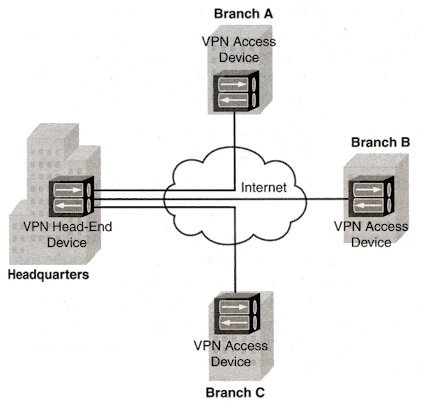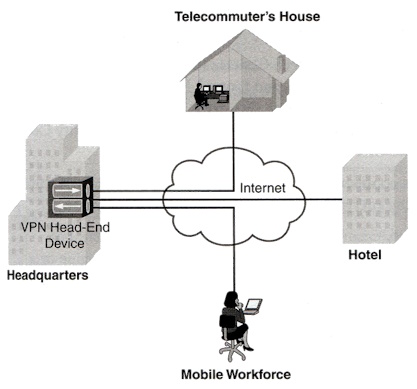• Site-to-site VPN: A site-to-site VPN interconnects two sites, as an alternative
to a leased line, at a reduced cost. Figure 19-1 shows an example of a site to site VPN. • Client-to-site VPN: A client-to-site VPN (also known as a remote access VPN)
interconnects a remote user with a site, as an alternative to dial-up or ISDN connectivity,
at a reduced cost. Figure 19-2 shows an example of a client-to-site VPN. • With a full tunnel configuration you have all the end-user traffic
go through the VPN tunnel. • With a split tunnel configuration you don't have all the end-user
traffic go through the VPN tunnel. For example, you might choose to have just the traffic
that needs to access the corporate network sent through the VPN tunnel, while allowing
traffic destined for the Internet (perhaps Office 360 traffic) to bypass the tunnel.
Split tunneling is often an advantageous configuration because the bandwidth required
by the VPN connection (and the overhead associated with it) can be minimized. About The Author Anthony Sequeira, CCIE No. 15626, is a Cisco Certified Systems Instructor (CCSI) and author
regarding all levels and tracks of Cisco Certification. Anthony formally began his career in
the information technology industry in 1994 with IBM in Tampa, Florida. He quickly formed his
own computer consultancy, Computer Solutions, and then discovered his true passion-teaching
and writing about Microsoft and Cisco technologies. Anthony joined Mastering Computers in 1996
and lectured to massive audiences around the world about the latest in computer technologies.
Mastering Computers became the revolutionary online training company, KnowledgeNet, and Anthony
trained there for many years. Anthony is currently pursuing his second CCIE in the area of
Security and is a full-time instructor for the next-generation of KnowledgeNet, StormWind.com.
Anthony is also a VMware Certified Professional.
CompTIA Network+ N10-008 Cert Guide contains proven study features that allow you to succeed
on the exam the first time. Expert instructor Anthony Sequeira shares preparation hints and
test-taking tips, helping you identify areas of weakness and improve both your conceptual
knowledge and hands-on skills, essential for successful completion of the performance-based
testing items on the exam. This complete, CompTIA-approved study package includes the following: • A test-preparation routine proven to help you pass the exams Well regarded for its level of detail, study plans, assessment features, challenging review
questions and exercises, video instruction, and hands-on labs, this approved study guide helps
you master the concepts and techniques that ensure your exam success. Master the topics on the CompTIA Network+ N10-008 exam, including: • Network topologies and media types Reader Paulo Cardoso says, "This is a great book. In addition, it comes with great additional resources."
Learn more about the CompTIA Network+ N10-008 Cert Guide at amazon.com More Networking Topologies Articles:
Figure 19-1 Site-to-Site VPN
Figure 19-2 Client-to-Site VPN
• Clearly defined chapter learning objectives covering all N10-008 exam topics
• Chapter-ending review questions and exam preparation exercises, which help you drill on key concepts you must know thoroughly
• The powerful Pearson Test Prep practice test software, complete with hundreds of well-reviewed, exam-realistic questions, customization options, and detailed performance reports
• 40 performance-based exercises to help you prepare for the hands-on exam questions
• A free copy of the CompTIA Network+ N10-008 Simulator Lite software, complete with meaningful lab exercises that enhance your hands-on skills
• More than 60 minutes of video mentoring
• A final preparation chapter that guides you through tools and resources to help you craft your review and test taking strategies
• An Exam Essentials appendix that quickly recaps all major chapter topics for easy reference, both in print and interactive digital format
• A key terms Glossary in both print and on the companion website, which acts as an interactive flash-card application
• Study plan suggestions and templates to help you organize and optimize your study time
• A 10% exam discount voucher (a $33+ value!)
• IP addressing
• Network services
• Data center architectures and cloud concepts
• Routing, Ethernet switching, and wireless networking
• Network availability and disaster recovery
• Network security
• Remote access
• Network troubleshooting
• Trunking, Bonding, Aggregation; What Does it Mean?
• Network Interface Cards (NIC)
• Here's a Quick Way to Build Your Fiber Optic Network
• Introduction to ATM (Asynchronous Transfer Mode) Networks
• Access Points and Wireless LAN Controller
• Data Center Management Best Practices
• Bluetooth Basics
• Troubleshooting Your Optical Fiber Networks - Introduction to OTDR
• Wireless Networks
• How Do Fiber Optic Couplers Work and How are They Made?



